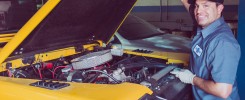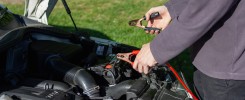How to properly operate a car in hot weather” is a common query, but the precise answer remains elusive for many. In our comprehensive article, we’ve gathered essential summer car maintenance tips to enhance your car’s longevity. Moreover, seamlessly integrate these insights with tips provided in this article.
The car inherently thrives in heat: elevated temperatures are the norm for many systems, optimizing efficiency. In the warmth, the engine requires a minimal warm-up, ensuring peak performance. With readily available warm oil, channels lubricate instantly, fuel combustion is complete, and flexibility issues in wires, hoses, and seals are non-existent. No freezing risks in the windshield washer reservoir or fuel line condensation. Despite the apparent ease, it’s prudent to proactively ready the car for the upcoming summer season.

HOW TO PREPARE FOR SUMMER HEAT
Getting your car ready for the summer season goes beyond a simple tire change. While that’s important (winter tires not only perform poorly on dry roads compared to specially designed summer tires but also struggle in hot temperatures), there are several other systems to consider.
1. Brake System:
- Check brake hoses, particularly susceptible to the impact of heat. Cracks, stretches, bulges, or leaks are reasons for immediate replacement.
- It’s recommended to replace brake fluid, especially if it’s older than two years, as old fluid may boil at lower temperatures.
2. Cooling System:
- Inspect the integrity and functionality of essential components (water pump, thermostat, fans).
- Clean radiators from dirt and seasonal deposits like seeds or cottonwood fuzz.
3. Fuel System:
- Inspect the fuel tank ventilation and check the integrity of fuel lines.
- Ensure the proper functioning of the fuel pressure regulator, especially in hot weather when gasoline evaporates more quickly.
4. Climate Control System:
- Replace the cabin air filter.
- Evaluate the performance of the air conditioner and, if necessary, recharge it.
5. Battery:
- Regularly check the electrolyte level in a serviceable battery, as water evaporates faster in the heat.
Additional Accessories:
- Invest in a reflective sunshade for the windshield, side window shades, and a car cover.
- Keep a spare bottle of antifreeze or distilled water handy to prevent engine overheating.
For High-Mileage Cars:
- Consider changing to a more viscous “summer” oil in the engine and transmission, especially for older vehicles, to prevent seepage through seals.
Prepare your vehicle for the summer heat to ensure a smooth and trouble-free driving experience.
HOW TO USE YOUR CAR IN THE HEAT
A modern car is a sophisticated machine designed to operate across a wide range of temperatures, making it suitable for use even in scorching weather. However, certain rules should still be followed:
- Avoid Prolonged Sun Exposure:
- Park your car in the shade whenever possible. If shade is scarce, crack open the windows or sunroof to allow additional ventilation. Ensure there’s no threat of theft or rain before doing so.
- Be Mindful of Interior Items:
- Avoid leaving aerosol cans, lighters, or other sealed containers with liquids, especially flammable ones, inside the car. The heat from the sun can cause them to explode.
- Never Leave Children or Pets Unattended:
- In the heat, the interior of a car can become dangerously hot. Never leave children or pets locked inside, as they can suffer from heatstroke.
- Regularly Wash and Polish Your Car:
- Clean and polish your car’s exterior frequently, especially if it’s a dark color. The natural shine of the paint reflects sunlight and reduces heat absorption.
- Smart Use of Air Conditioning:
- When entering a hot car, don’t immediately turn on the air conditioner. Open the doors and create airflow by waving them or driving with the windows and sunroof open for a short distance to ventilate the cabin.
- Avoid directing a blast of cold air onto a hot windshield until the interior has cooled down to prevent cracks.
- Monitor Car Gauges:
- Keep an eye on your car’s instruments, especially the coolant temperature gauge and warning light.
- Take Care of Yourself:
- Stay hydrated and take breaks to rest, especially during long drives.
- Don’t direct cold air directly onto your body or face to avoid catching a chill.
- Plan Smart Routes:
- Choose routes that minimize traffic congestion, especially during peak heat hours.
- Plan trips for early mornings or late evenings when the heat is less intense.
Enjoy owning and using your vehicle to the maximum with this summer car maintenance tips and remember that you can find all the spare parts and accessories that were listed in the article by filling out the form on the myNextParts service.



1 comment